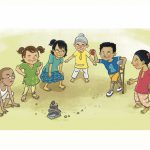Following on from my last post about the International Classification of Functioning, Health and Disability, today let’s consider the F-Words.
The F-Words are a fun way to think about the ICF for children. Developed by our friends at the Canadian organization CanChild, the F-Words are a simple and down-to-earth reminder of what’s important for kids. When a child is disabled, we can get so distracted by the impairment that we forget the main thing: a disabled child is a child first – they need what all children need.
So here’s a list of three of the all-important F-Words (there are six altogether – watch this space!):
Function
Family
Fitness
And to add to the excitement, we’ve got an illustration to go with each one.
 FUNCTION:
FUNCTION:
Every child wants to DO things. They want to take part in whatever is going on. Whether it’s eating or getting dressed or building a treehouse or riding a cycle, kids are active, engaged and busy.
Whether they are disabled or not, kids have their own ways of doing things. How they do things is not important. It really isn’t! Every child will make a mess when they first start to feed themselves. Every child will struggle to master buttoning a shirt or tying their shoes. Giving them space to figure things out for themselves tells them we respect their determination and that we have confidence in their abilities.
For everything else, there’s Velcro.
FAMILY:
Children live in families. And families are funny and varied and unique. They may have a mother and a father or two fathers or two mothers. There may be blends, with four sets of grandparents, multiple parents and a range of siblings according to the family’s own special way of functioning. Aunts and uncles may fill in for parents and cousins may be indistinguishable from “real” brothers and sisters. It doesn’t matter. Every child’s own family is the norm and their ways are the best.
When we work with disabled children, it’s all-important to remember that their families are their greatest strength. Nothing matters as much as families because without them, nothing happens.
FITNESS:
 Before television, computer games and YouTube, nobody had to think very much about kids’ fitness. Kids are born active. Watch any baby, toddler or young child to understand the meaning of perpetual motion. If there’s a rock they want to climb on it; if there’s a can they have to kick it. If something is here, they are going to to put it there and if there’s a ball lying around, you know it’s just asking to be thrown.
Before television, computer games and YouTube, nobody had to think very much about kids’ fitness. Kids are born active. Watch any baby, toddler or young child to understand the meaning of perpetual motion. If there’s a rock they want to climb on it; if there’s a can they have to kick it. If something is here, they are going to to put it there and if there’s a ball lying around, you know it’s just asking to be thrown.
Our sedentary lifestyles mean that now more and more children have problems with their weight and their fitness. For disabled kids, this can be even more of a concern.
Disabled children often need a bit of help or encouragement to be active. Movement isn’t always easy and games and sports which come like second nature to typical kids may be awkward or even painful for a disabled child.
That foundational belief spelled out in the FUNCTION section holds true here too: How they do things isn’t important. It really isn’t! Make sure they are safe and then leave them to it. Let children explore their own limits and strength and help them to participate in whatever way feels good. Give them permission, encouragement and support so that they can experience the joy of moving, bending, arching, turning and spinning. That will lead to dancing, swimming, skating and biking – maybe with training wheels, floats or other aids, but who cares? Because THAT will lead to confidence, friendship and a full, happy life.


